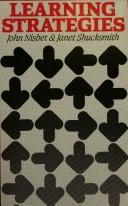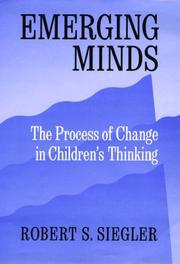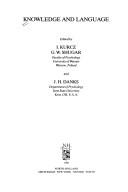| Listing 1 - 5 of 5 |
Sort by
|
Book
ISBN: 0471312754 Year: 1978 Publisher: New York Wiley
Abstract | Keywords | Export | Availability | Bookmark
 Loading...
Loading...Choose an application
- Reference Manager
- EndNote
- RefWorks (Direct export to RefWorks)
Cognitive psychology --- Cognitive styles --- Styles cognitifs --- 159.95*1 --- Styles, Cognitive --- Cognition --- Intellect --- Personality and cognition --- Cognitieve psychologie --- Cognitive styles. --- 159.95*1 Cognitieve psychologie

ISBN: 0710205694 9780710205698 Year: 1986 Publisher: London : Routledge & Kegan Paul,
Abstract | Keywords | Export | Availability | Bookmark
 Loading...
Loading...Choose an application
- Reference Manager
- EndNote
- RefWorks (Direct export to RefWorks)
Learning --- Cognitive styles --- Teaching --- Education, Secondary --- Educational surveys --- Apprentissage --- Styles cognitifs --- Enseignement --- Enseignement secondaire --- Education --- Curricula --- Programmes d'études --- Enquêtes --- Cognitive styles. --- Learning. --- Teaching. --- Experimentele psychologie --- Pedagogiek en onderwijskunde --- leren en intelligentie --- didactische principes --- leren en intelligentie. --- didactische principes. --- Leren en intelligentie. --- Didactische principes. --- Programmes d'études --- Enquêtes --- Curricula. --- Education, Secondary - Curricula - Scotland - Grampian --- Educational surveys - Scotland - Grampian

ISBN: 0195077873 Year: 1996 Publisher: New York (N.Y.): Oxford university press
Abstract | Keywords | Export | Availability | Bookmark
 Loading...
Loading...Choose an application
- Reference Manager
- EndNote
- RefWorks (Direct export to RefWorks)
Cognition in children. --- Cognitive styles in children --- Human information processing in children. --- Cognition chez l'enfant --- Styles cognitifs chez l'enfant --- Information, Traitement de l', chez l'enfant --- #PEDA *P 4.037 --- Cognition in children --- Human information processing in children --- Human information processing (Child psychology) --- Information processing in children --- Child psychology --- Cognition (Child psychology) --- Thought and thinking in children

ISBN: 1280611480 9786610611485 1402040148 140204013X 9781402040139 9781402040146 9048170125 Year: 2005 Volume: 19 Publisher: Dordrecht Springer
Abstract | Keywords | Export | Availability | Bookmark
 Loading...
Loading...Choose an application
- Reference Manager
- EndNote
- RefWorks (Direct export to RefWorks)
New Directions in Cognitive Information Retrieval presents an exciting new direction for research into cognitive oriented information retrieval (IR) research, a direction based on an analysis of the user’s problem situation and cognitive behavior when using the IR system. This contrasts with the current dominant IR research paradigm which concentrates on improving IR system matching performance. The chapters describe the leading edge concepts and models of cognitive IR that explore the nexus between human cognition, information and the social conditions that drive humans to seek information using IR systems. Chapter topics include: Polyrepresentation, cognitive overlap and the boomerang effect, Multitasking while conducting the search, Knowledge Diagram Visualizations of the topic space to facilitate user assimilation of information, Task, relevance, selection state, knowledge need and knowledge behavior, search training built into the search, children’s collaboration for school projects, and other cognitive perspectives on IR concepts and issues.
Information retrieval. --- Information behavior. --- Cognitive styles. --- Human-computer interaction. --- Information storage and retrieval systems. --- Styles, Cognitive --- Cognition --- Intellect --- Personality and cognition --- Information-seeking behavior --- Human behavior --- Data retrieval --- Data storage --- Discovery, Information --- Information discovery --- Information storage and retrieval --- Retrieval of information --- Documentation --- Information science --- Information storage and retrieval systems --- Automatic data storage --- Automatic information retrieval --- Automation in documentation --- Computer-based information systems --- Data processing systems --- Data storage and retrieval systems --- Discovery systems, Information --- Information discovery systems --- Information processing systems --- Information retrieval systems --- Machine data storage and retrieval --- Mechanized information storage and retrieval systems --- Computer systems --- Electronic information resources --- Data libraries --- Digital libraries --- Information organization --- Information retrieval --- Computer-human interaction --- Human factors in computing systems --- Interaction, Human-computer --- Human engineering --- User-centered system design --- User interfaces (Computer systems) --- Comportement dans la recherche de l'information. --- Interaction homme-machine (Informatique). --- Recherche de l'information. --- Styles cognitifs. --- Systèmes d'information. --- Information Technology --- Computer Science (Hardware & Networks) --- Computer science. --- Human Geography. --- Library science. --- Social sciences. --- Consciousness. --- Computer Science, general. --- Library Science. --- Social Sciences, general. --- Personality and Social Psychology. --- Apperception --- Mind and body --- Perception --- Philosophy --- Psychology --- Spirit --- Self --- Behavioral sciences --- Human sciences --- Sciences, Social --- Social science --- Social studies --- Civilization --- Librarianship --- Library economy --- Bibliography --- Anthropo-geography --- Anthropogeography --- Geographical distribution of humans --- Social geography --- Anthropology --- Geography --- Human ecology --- Informatics --- Science --- Human geography. --- Personality. --- Social psychology. --- Personal identity --- Personality psychology --- Personality theory --- Personality traits --- Personology --- Traits, Personality --- Individuality --- Persons --- Temperament --- Mass psychology --- Psychology, Social --- Social groups --- Sociology

ISBN: 0444700668 9780080866932 008086693X 9780444700667 1282617826 9781282617827 9786612617829 6612617829 Year: 1986 Volume: 39 Publisher: Amsterdam ; New York : New York, N.Y. : North-Holland ; Sole distributors for the U.S.A. and Canada, Elsevier Science Pub. Co.,
Abstract | Keywords | Export | Availability | Bookmark
 Loading...
Loading...Choose an application
- Reference Manager
- EndNote
- RefWorks (Direct export to RefWorks)
How do people represent their knowledge about the world and use that knowledge for communication? This question is the central theme of this book. Among the aspects discussed in the first three sections are: the relationship between formal, logical descriptions of language, and psychological analyses of language use; how knowledge interacts with language use; and childrens' acquisition of language in different countries. In the last two sections, the topics discussed include the complex relationships between the development, transmission, and comprehension of intention and meaning
Cognitive psychology --- Lexicology. Semantics --- Psycholinguistics --- Language acquisition --- Cognition --- Psycholinguistique --- Langage --- Congresses --- Congrès --- Acquisition --- Psycholinguistique. --- Cognition. --- Psycholinguistics. --- Language acquisition. --- Psychology --- Acquisition of language --- Developmental linguistics --- Developmental psycholinguistics --- Language and languages --- Language development in children --- Psycholinguistics, Developmental --- Interpersonal communication in children --- Language, Psychology of --- Psychology of language --- Speech --- Linguistics --- Thought and thinking --- Connaissance --- Cinéma --- Philosophie de l'esprit --- Dieu --- Thérapie cognitive --- Théorie de la connaissance --- Psychologie cognitive --- Sciences cognitives --- Distracteurs (psychologie) --- Cognition distribuée --- Énaction --- Écriture --- Lecture --- Pensée --- Attention --- Savoir-faire --- Fonctions exécutives (neuropsychologie) --- Abstraction --- Catégorisation (psychologie) --- Cognition et culture --- Compréhension --- Conservation (psychologie) --- Dissonance cognitive --- Traitement de l'information chez l'homme --- Nombre, Idée de --- Perception --- Perception des structures --- Styles cognitifs --- Cartes cognitives --- Schèmes (psychologie) --- Métacognition --- Constructivisme (psychologie) --- Intuition --- Psychologie --- Apprentissage verbal --- Enfants --- Langue maternelle, Acquisition de la --- (linguistique) --- Langues --- Parole --- Psychologie du langage --- Biolinguistique --- Neurolinguistique --- Psychanalyse et langage --- Attitudes linguistiques --- Compétence de communication (linguistique) --- Compétence et performance (linguistique) --- Conscience linguistique --- Contrôle (linguistique) --- Créativité (linguistique) --- Différenciateur sémantique --- Discours intérieur --- Langage et émotions --- Linguistique cognitive --- Perception de la parole --- Psychophonétique --- Saillance linguistique --- Son --- Tabous linguistiques --- Tests linguistiques --- Troubles du langage --- Linguistique --- Acquisition. --- Psychological aspects --- Aspect cognitif --- Cognoscibilité --- Tests --- Langage -- Acquisition --- Apprentissage --- Aspect psychologique --- Différences entre sexes --- Aspect symbolique --- Acquisition linguistique --- Innéisme (linguistique) --- Reconnaissance des mots --- Psychologie de l'apprentissage --- Language Development --- Psycholinguistic --- Language Acquisition --- Acquisition, Language --- Development, Language --- Cognitive Function --- Cognitions --- Cognitive Functions --- Function, Cognitive --- Functions, Cognitive --- Submorphologie --- Sériation (psychologie) --- Prospection épisodique --- Traitement de l'information (psychologie) --- Amorçage syntaxique --- Acquisition du langage --- Psychologie de la lecture
| Listing 1 - 5 of 5 |
Sort by
|

 Search
Search Feedback
Feedback About UniCat
About UniCat  Help
Help News
News